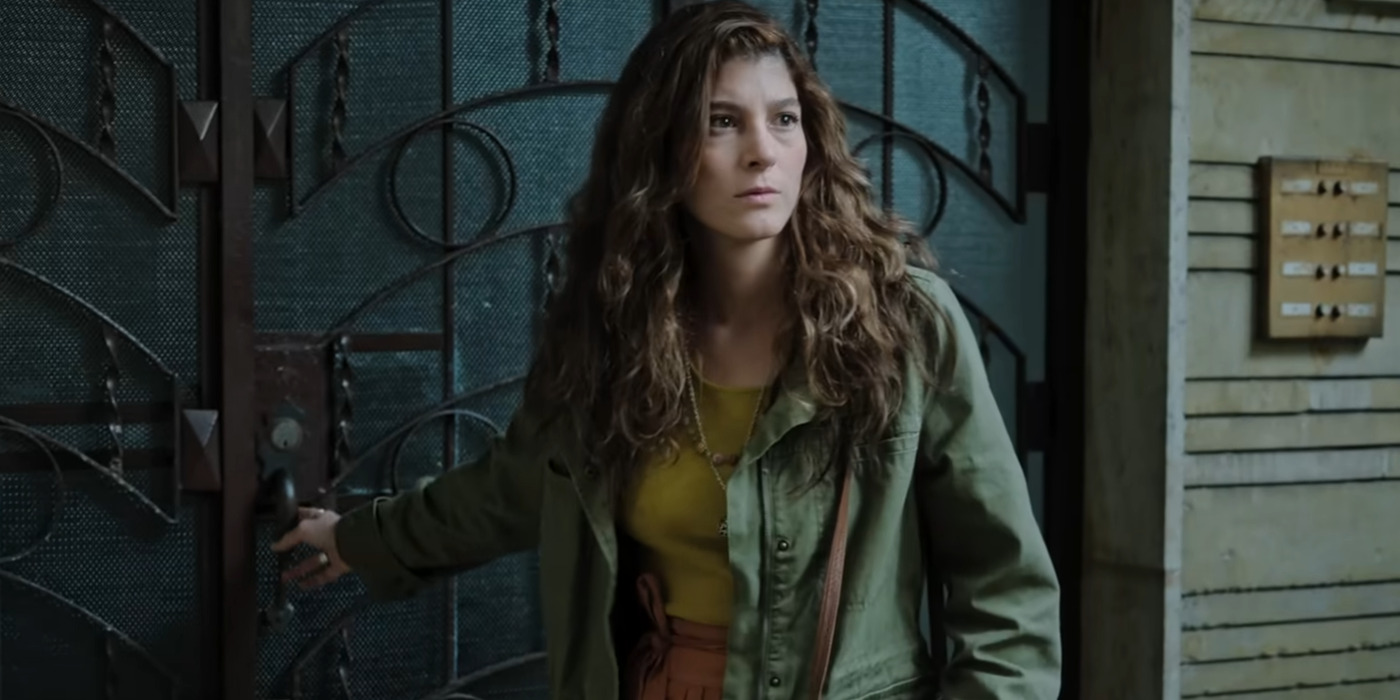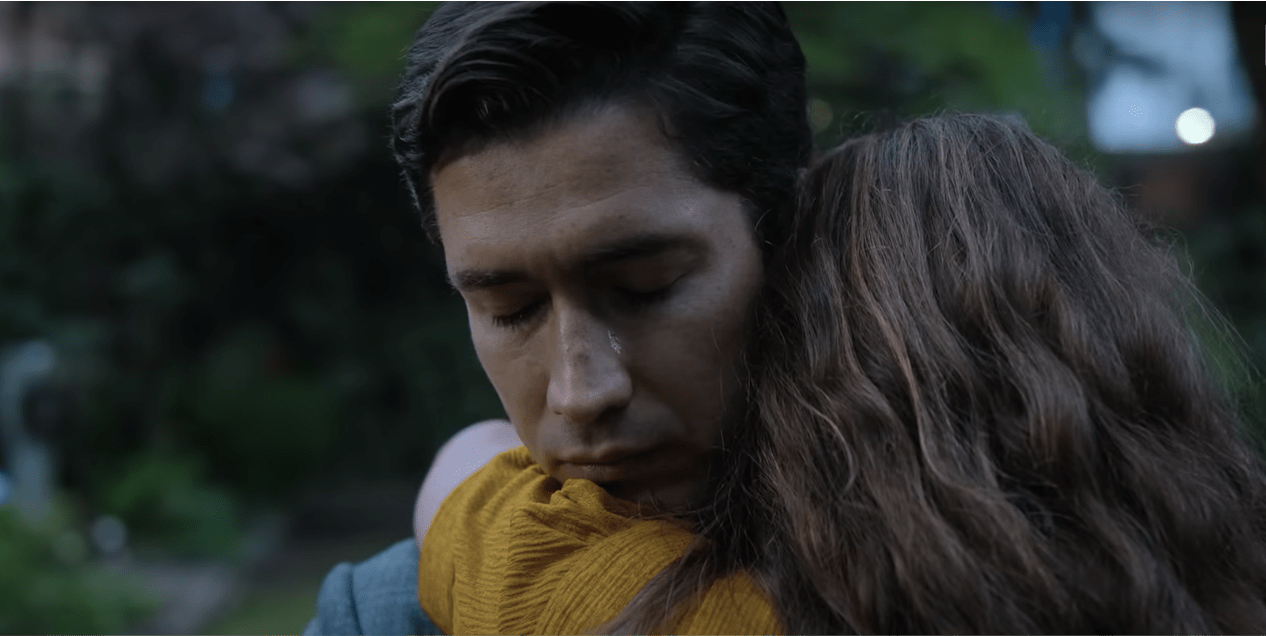At the end of Netflix’s ‘Delirium,’ Agustina’s past and present collide to unfurl all of the psychological trauma the protagonist has buried within her mind. Her husband, Aguilar, struggles to make sense of her current predicament, and his love for her is put to the test. At the center of the protagonist’s titular state of delirium is her dynamic with her family, the intricacies of which soon come to light, affecting everyone involved in unique ways. Meanwhile, Midas, an outsider, tries his hardest to fit in, even when the consequences threaten to consume him from the inside out. The result is a quicksand he can’t seem to escape, putting him in the same space as his former lover. When all is said and done, Agustina reevaluates her life and finally grasps her real priorities. SPOILERS AHEAD.
Delirium Plot Recap
The story employs a fragmented narrative that jumps between different time frames in Agustina’s life. As a teenager, she struggles with mental disorders, coupled with her family’s oppressive practices. When Bichi, her brother and anchor in life, is forced to leave the house for being gay, she gradually begins spiraling into a psychological mess. Relief seemingly comes in the form of Midas, her brother, Joaco’s friend, who, due to being from a poor family, brings a fresh perspective to her life. The two have their share of ups and downs, particularly when Midas gets involved with the Mafia and embroils her family in the business, but ultimately they get together. Eventually, Agustina gets pregnant, and her family reacts negatively, forcing her to have an abortion in America and end things with her lover.

In the present, Midas slowly rises to power as a key member of the Mafia, attracting the wealthiest clients. Meanwhile, Agustina, having left her home, meets Aguilar, a literature professor with strong political values. The two enter a relationship and get married, but soon, Agustina’s past creeps up on her. Following a failed pregnancy, she begins a slow descent into madness, which climaxes one day with her disappearance from the house. Aguilar eventually locates her in a hotel, and from this point on, the protagonist enters a state of complete delirium. Desperate for her recovery, Aguilar quits his job and takes full-time care of her. When that doesn’t seem to work, he has her admitted to a psychiatric facility. Yet, upon witnessing the harsh environment there, he chooses to bring her back home once again.
Things take a turn when Sofia, Agustina’s aunt, lands on his doorstep one day. She reveals that she was originally the one who took care of Agustina, and with this, she begins explaining their complex family history. While the protagonist has brief periods of wellness, they are often met with intense and at times violent bouts of paranoia and hallucinations, which only make their dynamics more complicated. Meanwhile, Midas slowly begins to lose his humanity; after enabling the murder of a sex worker named Jenny, he kills his rich client who did it. However, his time as a Mafia top-dog seemingly comes to an end when a police raid takes out the entire operation. While Midas survives, he is forced to go into hiding in Joaco’s residence. The fate of both him and Agustina remains uncertain.
Delirium Ending: Do Aguilar and Agustina Get Back Together?
The final sequence of the story brings together every thematic and narrative element in a moment of celebration, as Aguilar and Agustina finally work out their differences and get back together. Their success doesn’t come without its share of difficulties, but the fact that they manage to wade through that turbulent period further strengthens their relationship, which is now forged in greater trust and respect than before. Throughout the end, Agustina’s monologues in the background give perspective to their entire relationship thus far, and set the grounds for what their future might look like. She points out the importance of recognizing something is broken before attempting to fix it, as well as accepting that a fix can never be permanent, wherein lies the delicate beauty of a relationship.

The monologue is complemented by a montage that covers how Aguilar and Agustina’s future plays out. It begins with them undoing the tape that had been put up as a separation within the house. This symbolizes how the two are whole again, and their boundaries have come down. Following this, Agustina invites him on a date, suggesting he bring his laminated palm print, which appears in episode 1, as a show of their growth. This brings the dynamic full circle, as earlier in the story, she laminated it specifically because of the value it possesses. A person’s palm print remains the same regardless of age or experience. As such, it can be interpreted as a stand-in for Aguilar’s core as a human, which is what she fell in love with in the first place. Its permanence shows her that their marriage is also a transcendence of momentary turbulations.
Agustina’s emphasis on recreating the start of the relationship also has another significance. As a tarot practitioner, she understands that fate is not completely written in stone, and that a person’s actions can change it at any point in their journey, both material and spiritual. This is exemplified in her dynamic with her husband, which runs parallel to the narrative structure set up by her tarot cards, primarily those of Judgement and the Wheel of Fortune. These two cards symbolize the shedding of old weight and bringing a change to one’s life, which is a defining characteristic of Agustina’s journey. In the end, she apologizes to Aguilar for her actions and expresses her love and appreciation towards him. The latter, in turn, reiterates how much he loves her, showing how true love refuses to bend to difficult circumstances.
Why Did Agustina Fall Into Delirium?
The greatest test for Agustina and Aguilar’s love story is undoubtedly her period of complete nervous breakdown, following which she is found in a hotel room with no recollection of how she got there. What follows is a difficult period of recovery, wherein she frequently slips in and out of hallucinations and paranoia. Aguilar tries a host of solutions, personal and medical, but none seem to work, as he misses the fact that these are merely symptoms. The crux of what happened to her lies in her past and the relationships that have molded her thus far. He eventually learns the truth from Agustina herself, following her recovery. She explains that on the day of her disappearance, she had actually gone to attend her mother, Eugenia’s, birthday party, and from there, the events rapidly took a turn for the worse.

At the mansion, Agustina is immediately reintroduced to the suffocating environment she ran away from, as her mother criticizes her choice of clothing for not being sophisticated enough. Following this, Agustina finds Midas, and the two quickly escape the pretense of the gathering and find their way to the protagonist’s favorite place, by the lake. Here, the two discuss how things between them have changed forever, exemplified by the secrets he is keeping from her. Joaco soon ropes her back into the party, where he begins his speech, which is comprised entirely of praises for his mother. Hearing the insincerity of his words sparks a fire inside the protagonist’s mind, and one by one, she begins revealing all the secrets of the family. She discloses how Eugenia relegated all of her motherly responsibilities to her sister and let the latter have an affair with her husband, all to maintain a pristine image of their family.
Agustina doesn’t stop there and brings up how her brother, Bichi, has been erased from the family for being gay. This, along with the reveal of Joaco’s dwindling business, is enough to unravel the family’s image in front of the guests. However, what should register as a moment of catharsis for the protagonist instead takes a dark turn when her brother brings up the death of her baby during childbirth. That event marks the culmination of all of Agustina’s anxieties and fears, which resultantly trigger her mental health crisis. She begins to grow paranoid of the guests, including Midas, believing that they are conspiring against her. All of these triggers culminate in the form of her violent outburst, and she runs away from the house, the root of all of her psychological distress.
The Family’s Tragic Past is Key to Understanding Agustina
Agustina’s crisis is not a one-off incident, as it has a precedent within her own family, in the form of her grandfather, Nicolás Portolinus. In a backstory as recalled by Sofia, we learn that Nicolás was a free-spirited pianist who was suffering from tinnitus, which likely points to a larger body of psychological disorders. Over the course of the story, we learn that his illness gradually took a toll on him, leading to his dying by suicide in the same lake that Agustina cherishes in the present. The parallels between the two characters are undeniable, and she herself brings it up, stating that she hears voices as well. For both of these characters, their disorders inhibit them from living the kind of life that they desire. However, while Nicolás chooses to take his own life, Agustina follows a different route.

Another key detail about Nicholas is his affair with his piano student. This serves as another point of contrast between him and his granddaughter, who marries her professor and ultimately finds peace with him. Nicholas is also the most crucial element in informing Eugenia’s character, likely causing her stigma towards people who are gay, while also marking the beginning of her negative trait: burying the truth in order to live a happy lie. As such, Agustina’s so-called delirium is more than a hindrance. It is a subconscious rejection of her family’s way of life, which involves covering up all inconveniences and chasing normalcy. By openly accepting all of her mental states as parts of herself, she reaches one step closer towards true self-affirmation and finds clarity in life.
What Happened at the Hotel? Why Doesn’t Agustina go Back to Midas?
Following Agustina’s breakdown at the party, Midas brings her to a hotel, where he has a heartfelt conversation with her. Here, he declares his love for her and laments the kind of life he chose. Understanding that his time as a free man is now up, Midas doesn’t push to reignite his relationship with her. Instead, he promises his support and vows to put an end to his previous lifestyle. However, mid-conversation, he realizes that Agustina is no longer in a state fit to have a discussion. At this point, he breaks down and finally admits to his biggest flaw: ignoring her mental health. He explains that he was so caught in the idea of her and proving his own self-worth in a world full of rich people that he forgot to invest time into actually caring about how she felt.

In light of this, Midas leaves her with a final piece of information: that he will be hiding at his mother’s place. When Agustina recovers her memories, instead of going to meet Midas herself, she asks Aguilar to visit him if he wants to know the truth of what happened in the hotel. Her actions hold great meaning, as they can be interpreted to define her ultimate choice between her two lovers, present and past. In loving Aguilar, she shows her growth over the years, learning to value sincerity over everything else. The fact that she and Midas do not work out as a pair is well indicated by their past conversations, where she points out that he resembles her family, trampling innocent lives for his personal goals. In contrast, Aguilar’s selfless dedication to his wife shows how he is the better fit.
Aguilar ultimately makes his way to Midas’s hideout, where the two briefly interact and converse about Agustina. Midas’s only question is about her health, and upon learning that she is doing better, he seems satisfied and continues on with his life. This shows that he, too, has accepted his sins and decided to give his former partner space to start her life anew. While his future is likely to remain grim for a very long time, Agustina has a chance to find warmth and happiness in her life. Nonetheless, both characters leave their tragic pasts behind with new lessons learnt, and a better perspective for the future.
Read More: Is Delirium a True Story? Is the Netflix Show Based on Real Life?


